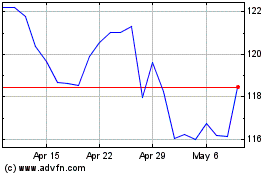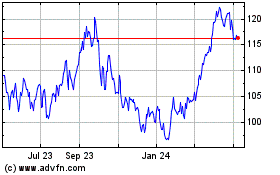Oil Sector, Investors React to SEC Probe of Exxon -- Update
September 21 2016 - 7:18PM
Dow Jones News
By Bradley Olson and Michael Rapoport
The federal investigation of how Exxon Mobil Corp. values assets
in a world of increasing climate change regulations elicited sharp
reactions on Wednesday, with some investors seeing it as a tipping
point in a campaign to get companies to disclose climate risks, and
some oil industry leaders calling it a politically motivated
attack.
But many agreed on one thing: It was a potentially
transformative moment for U.S. companies, which now have to worry
about regulators' scrutiny of future climate change impacts more
seriously than before.
The probe by the U.S. Securities and Exchange Commission is
focused on how Exxon calculates the impact to its business from
climate change, including what figures the company uses to evaluate
the viability of future projects.
The SEC hasn't publicly disclosed it is investigating Exxon, but
the probe was confirmed by an Exxon spokesman on Tuesday.
Defenders of Exxon saw the probe as an indication that the SEC
has moved into partisan politics, taking up a cause championed by
some Democratic state attorneys general, who have led probes into
the company's response to climate change.
"It seems like to me it's a witch hunt," Scott Sheffield, chief
executive of oil producer Pioneer Natural Resources Co., said
during an industry conference Wednesday, adding that Exxon is often
a target in such matters because of its size.
Some investors and activists, meanwhile, cited what they saw as
Exxon's insularity, and its refusal to face up to potential threats
to its future value, as a potential rationale for the SEC.
The company's pushback amid pressure from some shareholders on
the issue is emblematic of the response of many U.S. oil and gas
companies, a strategy that is likely to change in the face of new
SEC scrutiny, said Anne Simpson, the investment director for
sustainability at the California Public Employees' Retirement
System.
"Exxon has not been open to the questions and concerns of its
long-term investors on this issue," she said. "Five years ago it
may have been plausible for Exxon to say that it did not have to
think about a transition in energy use, but it can't say that
now."
Exxon and the SEC declined to comment on Wednesday.
The central question for companies and regulators is how the
global response to climate change -- which has begun to come
together after a landmark agreement to reduce emissions between
nearly 200 countries in Paris last year -- will affect industries
from oil and gas to utilities and transportation.
While many companies, investors and analysts agree that many
industries will be affected as countries move to reduce emissions,
there remains considerable debate about the extent of the
impact.
Moody's Investors Service in June said it would begin to assess
the credit implications of a transition away from carbon-intensive
energy use. Coal companies and power utilities are among the most
exposed, according to Moody's.
A 2015 report by BlackRock Inc., which manages nearly $5
trillion in assets, opined that efforts to mitigate climate change
will produce winners and losers that won't always be obvious. Some
low-cost operators, for example, may "do fine," the report
said.
For years, an array of investors and activists have pressured
U.S. regulators to insist that companies do more to assess how
their fortunes may rise or fall as the global effort to reduce
emissions intensifies. Under guidance issued by the SEC in 2010,
companies must disclose the impact of climate change and the
potential risk to their future business if it is deemed
material.
Critics say the SEC hasn't done enough to force companies to
tell investors more about their exposure to climate change. The
agency is currently looking at the possibility of imposing stiffer
disclosure requirements.
"The SEC has been noticeably quiet in enforcing the climate
disclosures it called for," said Michael Gerrard, an
environmental-law expert at Columbia Law School.
According to a 2014 report from Ceres, an advocacy group that
has pushed for more corporate disclosure about the effects of
climate change, 41% of S&P 500 companies didn't address climate
change in their 2013 securities filings, and those that did varied
widely in the detail and quality of their disclosures.
Some oil companies have pushed back against the idea of fuller
climate change disclosures, in comment letters to the SEC on its
current potential overhaul of disclosure requirements. Chevron
Corp. said in a July letter that its annual report already
contained a significant discussion about the potential risks of
additional regulation of greenhouse gases, and we "do not believe
requiring a more structured disclosure of risk would aid the
reasonable investor in understanding the risks facing the
company."
Exxon weighed in last month. While it didn't specifically
mention climate change, it said the SEC "should avoid promoting
political, social, and public policy objectives" in its disclosure
requirements.
--Erin Ailworth contributed to this article.
Write to Bradley Olson at Bradley.Olson@wsj.com and Michael
Rapoport at Michael.Rapoport@wsj.com
(END) Dow Jones Newswires
September 21, 2016 19:03 ET (23:03 GMT)
Copyright (c) 2016 Dow Jones & Company, Inc.
Exxon Mobil (NYSE:XOM)
Historical Stock Chart
From Mar 2024 to Apr 2024

Exxon Mobil (NYSE:XOM)
Historical Stock Chart
From Apr 2023 to Apr 2024
